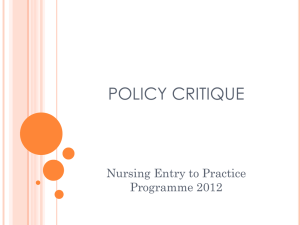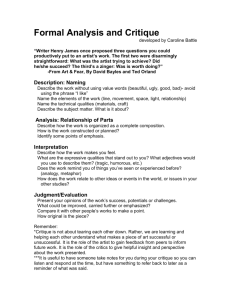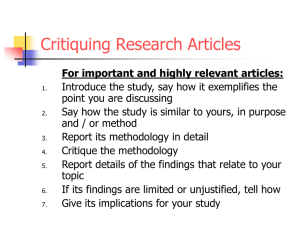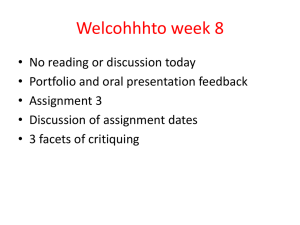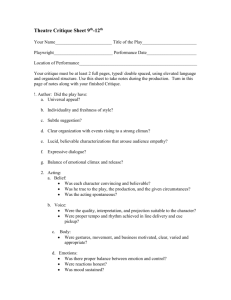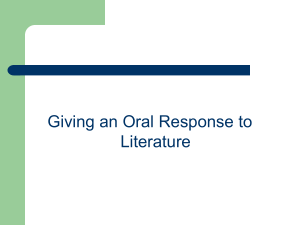FACULTY Joyce K. Stechmiller, ACNP-BC, PhD
advertisement
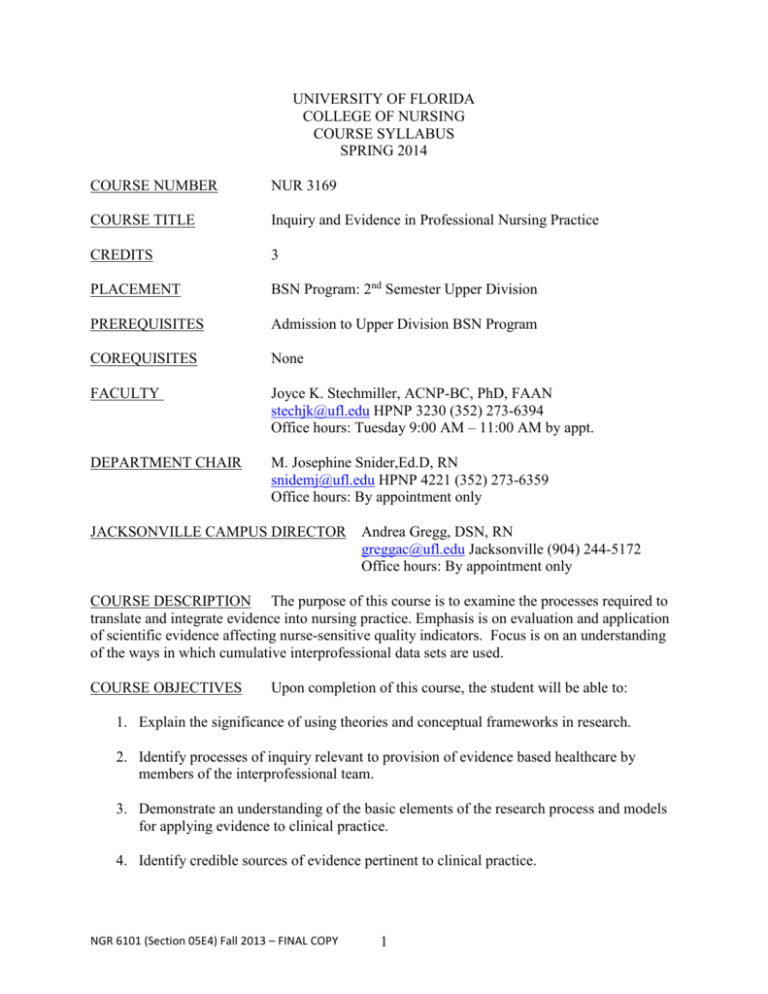
UNIVERSITY OF FLORIDA COLLEGE OF NURSING COURSE SYLLABUS SPRING 2014 COURSE NUMBER NUR 3169 COURSE TITLE Inquiry and Evidence in Professional Nursing Practice CREDITS 3 PLACEMENT BSN Program: 2nd Semester Upper Division PREREQUISITES Admission to Upper Division BSN Program COREQUISITES None FACULTY Joyce K. Stechmiller, ACNP-BC, PhD, FAAN stechjk@ufl.edu HPNP 3230 (352) 273-6394 Office hours: Tuesday 9:00 AM – 11:00 AM by appt. DEPARTMENT CHAIR M. Josephine Snider,Ed.D, RN snidemj@ufl.edu HPNP 4221 (352) 273-6359 Office hours: By appointment only JACKSONVILLE CAMPUS DIRECTOR Andrea Gregg, DSN, RN greggac@ufl.edu Jacksonville (904) 244-5172 Office hours: By appointment only COURSE DESCRIPTION The purpose of this course is to examine the processes required to translate and integrate evidence into nursing practice. Emphasis is on evaluation and application of scientific evidence affecting nurse-sensitive quality indicators. Focus is on an understanding of the ways in which cumulative interprofessional data sets are used. COURSE OBJECTIVES Upon completion of this course, the student will be able to: 1. Explain the significance of using theories and conceptual frameworks in research. 2. Identify processes of inquiry relevant to provision of evidence based healthcare by members of the interprofessional team. 3. Demonstrate an understanding of the basic elements of the research process and models for applying evidence to clinical practice. 4. Identify credible sources of evidence pertinent to clinical practice. NGR 6101 (Section 05E4) Fall 2013 – FINAL COPY 1 COURSE OBJECTIVES (continued): 5. Identify nurse-sensitive quality indicators and performance measures. 6. Analyze discrepancies between evidence based standards of care and common practices that impact client outcomes. 7. Discuss legal and ethical issues pertinent to the acquisition of scientific evidence. COURSE SCHEDULE Section 1C59 1C69 Day Tuesday Tuesday Time 12:50-3:50 12:50-2:45 & 4:05-4:55pm Room G101 G101 G103 E-Learning in Sakai is the course management system that you will use for this course. ELearning in Sakai is accessed by using your Gatorlink account name and password at http://lss.at.ufl.edu. There are several tutorials and student help links on the E-Learning login site. If you have technical questions call the UF Computer Help Desk at 352-392-HELP or send email to helpdesk@ufl.edu. It is important that you regularly check your Gatorlink account email for College and University wide information and the course E-Learning site for announcements and notifications. Course websites are generally made available on the Friday before the first day of classes. ATTENDANCE Students are expected to be present for all scheduled classes, other learning experiences, and examinations. Students who have extraordinary circumstances preventing attendance should explain these circumstances to the course instructor prior to the scheduled class or as soon as possible thereafter. Instructors will then make an effort to accommodate reasonable requests. A grade penalty may be assigned for late assignments, including tests. ACCOMMODATIONS DUE TO DISABILITY Each semester, students are responsible for requesting a memorandum from the Disability Resource Center (http://www.dso.ufl.edu/index.php/drc/) to notify faculty of their requested individual accommodations. This should be done at the start of the semester. COUNSELING AND MENTAL HEALTH SERVICES Students may occasionally have personal issues that arise on the course of pursuing higher education or that may interfere with their academic performance. If you find yourself facing problems affecting your coursework, you are encouraged to talk with an instructor and to seek confidential assistance at the University of Florida Counseling and Wellness Center, 352-3921575, visit their web site for more information: http://www.counseling.ufl.edu/cwc/. NGR 6101 (Section 05E4) Fall 2013 – FINAL COPY 2 STUDENT HANDBOOK Students are to refer to the College of Nursing Student Handbook for information about College of Nursing policies, honor code, class demeanor, and professional behavior. http://nursing.ufl.edu/students/student-policies-and-handbooks/. ACADEMIC HONESTY The University of Florida Student Conduct and Honor Code may be found at http://www.dso.ufl.edu/index.php/sccr/process/student-conduct-honor-code/ TOPICAL OUTLINE 1. Relationships between and among theory, practice, and research 2. Carper’s ways of knowing 3. Principles and models of evidence-based practice 4. Evaluating sources of evidence 5. Nurse sensitive quality indicators and performance measures 6. Forces driving research agendas in the professions 7. Ethical conduct of scholarly work 8. Qualitative research methods 9. Quantitative research methods a. Problems, questions, and hypothesis b. Design c. Reliability and validity d. Sampling e. Data analysis and meta-analysis 10. Dissemination of scholarship 11. Translation of evidence into practice TEACHING METHODS Web-based asynchronous learning modules, small group seminars, selected readings and electronic sources LEARNING ACTIVITIES Small group discussions, seminar presentations, and attendance at selected research meetings EVALUATION METHODS/COURSE GRADE CALCULATION Assignments Journal Club Percent 10 Clinical Research Problem Presentation Brainstorming 12 per week First Clinical Problem Research Paper Quizzes 5 15 60 Second Clinical Problem Research Paper Total 10 100% NGR 6101 (Section 05E4) Fall 2013 – FINAL COPY 3 Due Date Weekly March 11 Feb 25,April 15, April 30 April 22 Assignments/Papers will be returned within 10 working days. MAKE UP POLICY There will be no make-ups for missed quizzes and exams. If a student misses an exam, the score on the final exam will be the score for the final exam and the missed exam. GRADING SCALE/QUALITY POINTS A 95-100 (4.0) C A93-94 (3.67) CB+ 91- 92 (3.33) D+ B 84-90 (3.0) D B82-83 (2.67) DC+ 80-81 (2.33) E 74-79* (2.0) 72-73 (1.67) 70-71 (1.33) 64-69 (1.0) 62-63 (0.67) 61 or below (0.0) * 74 is the minimal passing grade For more information on grades and grading policies, please refer to University’s grading policies: https://catalog.ufl.edu/ugrad/current/regulations/info/grades.aspx FACULTY EVALUATION Students are expected to provide feedback on the quality of instruction in this course based on ten criteria. These evaluations are conducted online at https://evaluations.ufl.edu. Evaluations are typically open during the last two or three weeks of the semester, but students will be given specific times when they are open. Summary results of these assessments are available to students at https://evaluations.ufl.edu. REQUIRED TEXTS American Psychological Association. (2010). Publication manual of the American Psychological Association (6th Ed.). Washington, DC: Author. Houser J (2014). Nursing research: Reading, using, and creating evidence (3th Ed.). Burlington: Jones & Bartlett Learning. NGR 6101 (Section 05E4) Fall 2013 – FINAL COPY 4 Date Jan 7 Jan 14 Jan 21 Lecture Part I Introduction to Research Introduction to Course Importance of Research as Evidence in Nursing Dr. Stechmiller The Research Process and ways of knowing; Key concepts and steps in qualitative and quantitative research in class- Dr. Stechmiller Concepts/Theories/Research Research as Evidence in Nursing Practice; Purpose of Nursing Research; Levels of Evidence; Resources for EBP; Ethics in Nursing Research Controlling the research situation IRB; HIPPA; data safety; human subjects safety The Research Process; Qualitative and quantitative research NGR 6101 (Section 05E4) Fall 2013 – FINAL COPY Journal Club LOE review for Journal Club; Journals as resources for EBP; Impact factors; examining Journals for critical information Journal Club Critiquing Research articles; Guide to an overall critique of a quantitative research report (Box 5.2) research problem, hypothesis, questions, variables; critique of research report – critique theory Journal Club Critiquing Research articles; Guide to an overall critique of a quantitative research report (Box 5.2) research problem, hypothesis, questions, variables; critique of research report – critique theory Readings Houser Chapter 1 Houser Chapter 2 Houser Chapter 3 Assignment http://guides.uflib.ufl.edu/nursing review research literature search procedures Sign up for clinical problem presentation Sign up for Journal club group Initiate literature review for investigation of clinical problem for class paper and presentation Initiate literature review for clinical problem; sign up for clinical problem presentation Clinical Problem Presentations (12) NGR 6101 COURSE SYLLABUS PAGE 6 Date Jan 28 Lecture Concepts/Theories/Research Part 2: Planning for Finding Research problems Research and writing questions, Conceptualizing and hypotheses planning a study to generate evidence; Overview of research problems, questions and hypotheses Dr. Stechmiller Feb 4 Literature Reviews; finding and critiquing evidence Feb 11 Research-theory link; Theories, models and frameworks; nature of models used in nursing research ; Assessment of a model or theory Generating document1 Health Belief Model, Penders Model, Cognitive Behavior Model, Stress and Coping Model Journal Club Journal Club Critiquing Research articles;Guide to an overall critique of a quantitative research report research problem, questions, begin using critique of research report (LOE) Journal Club Critiquing Research articles;Guide to an overall critique of a quantitative research report research problem, hypotheses, questions, variables; critique of research report; LOE Journal Club Critiquing Research articles;Guide to an overall critique of a quantitative research report research problem, hypotheses, questions, variables; critique of research report; LOE Readings Houser Chapter 4 Assignment Clinical problem presentations (12) Houser Chapter 5 Clinical Problem Presentation (12); Clinical Problem Presentations (12) NGR 6101 COURSE SYLLABUS PAGE 7 Date Feb 18 Lecture Qualitative Research Feb 25 March 11 Quiz 1 Part 3: Research Process document1 Concepts/Theories/Research Journal Club Journal Club Critiquing Research articles;Guide to an overall critique of a quantitative research report research problem, hypotheses, questions, variables; critique of research report; LOE No Journal Club Planning Quantitative and Qualitative Studies APA Journal Club Critiquing Research articles; Guide to an overall critique of a quantitative research report (Box 5.2) research problem, hypotheses, questions, variables, critique of research report – critique theory Box 6.1 LOE Readings Houser Chapter 6, 8 Assignment Practice Quiz Clinical Problem Presentations (12) Paper 1 due NGR 6101 COURSE SYLLABUS PAGE 8 Date March 18 Lecture Designing and conducting Quantitative studies to generate evidence for nursing Quantitative Research March 25 Rigor and Validity in Quantitative Research Specific types of quantitative research April 1 Sampling in Quantitative Research document1 Concepts/Theories/Research Journal Club Journal Club Critiquing Research articles; Guide to an overall critique of a quantitative research report (Box 5.2) research problem, hypotheses, questions, variables; critique of research report – critique theory Box 6.1 LOE Journal Club Critiquing Research articles; Guide to an overall critique of a quantitative research report (Box 5.2) research problem, hypotheses, questions, variables; critique of research report – critique theory Box 6.1 LOE Journal Club Critiquing Research articles; Guide to an overall critique of a quantitative research report (Box 5.2) research problem, hypotheses, questions, variables; critique of research report – Readings Houser Chapter 9,12 Assignment Clinical Problem Presentations (12) Houser Chapter 1011 Clinical Problem Presentations (12) Houser Chapter 7 Clinical Problem Presentation (12) NGR 6101 COURSE SYLLABUS PAGE 9 Date April 8 Lecture Data Collection in Quantitative Research April 15 April 22 Quiz 2 April 30 10am Final Concepts/Theories/Research Analysis & Reporting Quantitative Data Approved: Academic Affairs Committee: General Faculty: UF Curriculum Committee: Journal Club Journal Club Critiquing Research articles; Guide to an overall critique of a quantitative research report (Box 5.2) research problem, hypotheses, questions, variables; critique of research report – critique theory Journal Club Critiquing Research articles; Guide to an overall critique of a quantitative research report (Box 5.2) research problem, hypotheses, questions, variables; critique of research report – critique theory 09/09 09/09 10/09 h:\faculty work\spring 2014\nur 3169 sections 1c59 & 1c69stechmiller.docx document1 Readings Houser Chapter 8 Assignment Clinical Problem Presentation (12) Houser Chapter 13 Clinical Problem Presentation (12) Clinical Problem Presentation (12); Paper 2 due

